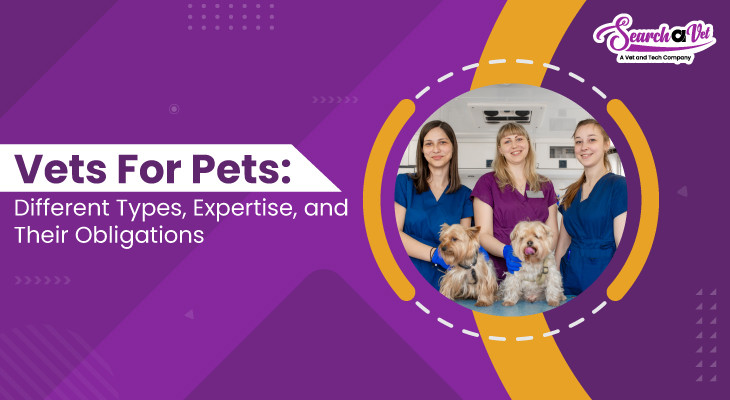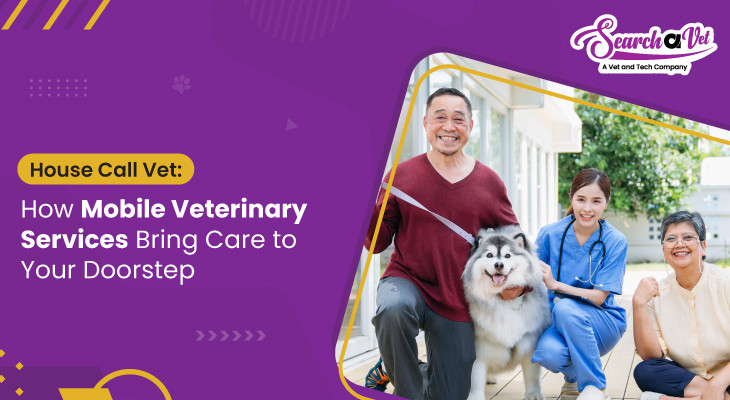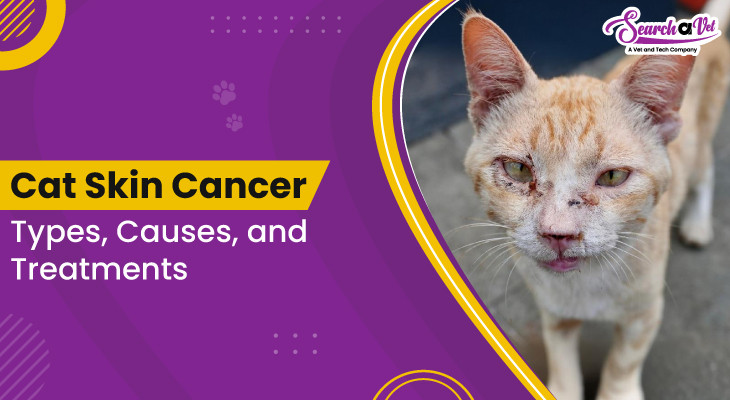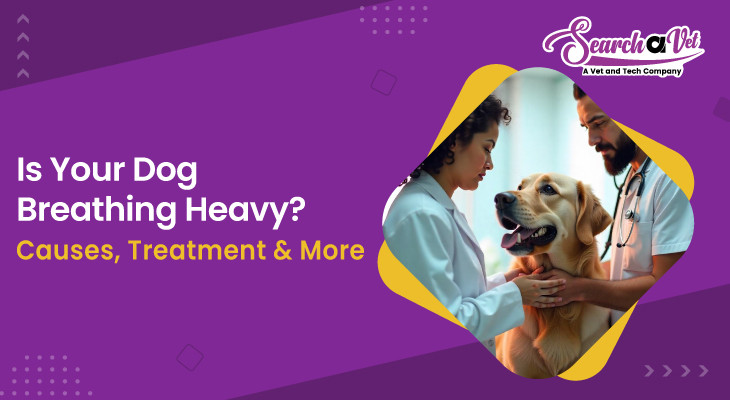Vets For Pets: Different Types, Expertise, and Their Obligations
 Sep 10, 2024
Sep 10, 2024

Having a pet is the most incredible emotional support one can ever feel in their life. However, keeping furry friends in good health requires dedication, time, and effort. Well, one of the easiest ways to look after your pet is by maintaining a regular visiting schedule to the veterinary office.
There are so many vets in the market currently, making it difficult for pet owners to choose the best vet for their pets. There is a specialist for almost any problem concerning animal health issues, whether it is veterinary food consultants, dentists, general practitioners, or even cardiology surgeons.
In this blog, we shall briefly describe each of the pet vets, their specialties, and what they do. You’ll also get some ideas regarding when to consult the vet.
So, let’s start!
What Are the Different Types of Vets for Pets?
There are several types of veterinary professionals. For example, food animal specialists, laboratory experts, and more.
Here is the list of the most popular types of vets:
1- Veterinary Behaviorists
A veterinary behaviorist is a specialized veterinary expert on animal behavior. Veterinary behaviorists undergo special training to enhance their skills in diagnosing and treating behavioral issues.
They can treat animals suffering from the following health conditions:
- Separation anxiety
- Chewing disorders
- Phobias
- Aggression and other complex behavior issues.
Visiting a Veterinary behaviorist can help your pet overcome anxiety or phobia.
When to Consult a Veterinary Behaviorist?
When any of the blow changes appear in your pet's behavior, then it’s the right time to consult a veterinary behaviorist.
⇒Sudden Behavior Changes
- Abrupt changes in your pet's behavior, like hunger or repeated howls
- Physical allergies that develop suddenly or alongside behavioral changes
- Changes in a litter box or bathroom habits (urination or defecation outside designated areas)
⇒Hostile Behavior
- Aggressive growls, snaps, or bites at other animals or even humans
- Shows destructive behaviors like chewing furniture or digging due to aggression
- Exhibits territorial aggression by guarding objects or spaces
⇒Unsuccessful Training
- Regular training sessions aren't yielding results after multiple attempts with a qualified trainer.
- Struggling to manage your pet's unwanted behaviors despite consistent training efforts
- Opposing behavior that causes a significant strain on your relationship with them
⇒Hormonal Imbalance or Pain
- Behavioral changes develop after complex surgeries or alongside hormonal issues like those in unspayed/unneutered pets
- Displays physical discomfort alongside behavioral changes, such as pacing or hiding
- Suspect an underlying medical condition might contribute to your pet's behavioral issues
2- Large Animal Veterinarians
Large animal veterinarians deal with diseases affecting large animals like cows, pigs, horses, sheep, and goats. These vets for pets aim to improve the quality of life of animals found on farms as well as those kept in households. Specialists in large animal veterinarians normally practice in rural regions.
The veterinarians who practice in this field have a good knowledge of disease, treatment, and body functions. These veterinary professionals use their clinical abilities and real-world experience to devise solutions to eradicate fatal viral diseases, cardiology, hormonal therapies, etc.
When to Consult a Large Animal Veterinarian?
The large animal veterinarians can be visited for the following reasons,
- Like small animals, large animals need frequent exams to prevent health concerns and detect early signs.
- Before breeding, a veterinarian can check the male and female for health.
- If needed, large animal veterinarians can monitor the mother and fetus during pregnancy and help with smooth delivery.
- If your large animal has an injury, unexpected hunger changes, lethargy, or odd droppings, contact a large animal veterinarian immediately.
- Many parasites affect large mammals. Your vet can offer parasite-control drugs and practices to keep your pets healthy.
- Large animals need vaccinations to avoid serious infections. Depending on age, species, and lifestyle, a veterinarian can prepare a vaccine program for your pets.
- A veterinarian can recommend a diet for your large animal based on age, breed, activity level, and health.
3- Small Animal Vets
Small animal veterinarians are professionals who have unique skills in identifying diseases affecting small animals such as cats, dogs, rabbits, and other domestic animals. These vets for pets have professional expertise and versatility, tackling oral health problems, administering injections, offering dietary advice, undertaking operations etc., and managing animal behavior. Small animal veterinarians are employed in private practices, large and complex hospitals, and animal shelters.
When to Consult a Small Animal Veterinarian?
You may need to visit small animal veterinarians for the following concerns;
- Visiting a veterinary health professional monthly or yearly can protect the animals from various diseases.
- In order to improve the oral health of the pets, you must visit small animal veterinarians.
- Small animal veterinarians also administer vaccination. Visit these vets for immunizations for pets with newborns. They also recommend vaccinations for old pets.
- These vets specialize in controlling the parasite development in small animals or pets.
- Small animal Veterinarians offer professional diet plans to improve the pets' overall health and immune system.
4- Veterinary Ophthalmologists
These veterinary professionals specialize in treating animal eye complications. These vets for pets undergo specialized training after the standard graduation. During their training years, Veterinary Ophthalmologists learn skills to tackle the delicate structures of animal eyes.
Veterinary Ophthalmologists diagnose and treat various eye problems. They also conduct cataract surgeries, retinal detachment surgeries, and other procedures.
When to Consult a Veterinary Ophthalmologist?
You can visit a Veterinary Ophthalmologist if you notice these symptoms:
⇒Excessive tearing or discharge
If your pet suffers from excessive discharge or tearing in the eyes, it’s essential to consult a doctor immediately. This symptom of a severe eye infection can lead to more critical conditions.
⇒More frequent squinting
This symptom indicates that your pet might have vision issues. Consult a Veterinary Ophthalmologist for the necessary care and treatment.
⇒Change in eye color
This symptom could indicate cataracts, glaucoma, or inflammation. You must visit a Veterinary Ophthalmologist immediately after witnessing this symptom.
Final Words!
There are numerous vets for pets, and choosing the right one starts with identifying your pet’s disease. Once done, begin researching the right veterinary professional in your area. You check the internet and ask for recommendations from friends or experts. With all these tips, you can easily find the best veterinary expert.
At Search a Vet, pet owners can learn and find the best veterinarian in their closest area to treat their pet's health and take expert consultation. We connect you to top veterinarians, animal hospitals, and veterinary clinics for smooth online appointments. We aim to bridge the gap between pet parents and animal health care professionals to make pet health more accessible.
FAQs
What is the price of a visit to the vet?
In the US, a typical veterinarian visit costs $20 to $100, although this might vary according to the location, services rendered, and particular medical issues.
How do I choose a vet?
Start with seeking recommendations from friends and veterinary experts. You can also search online for testimonials to find a credible vet. Most importantly, consider the vet’s experience and credentials before scheduling the appointment.




